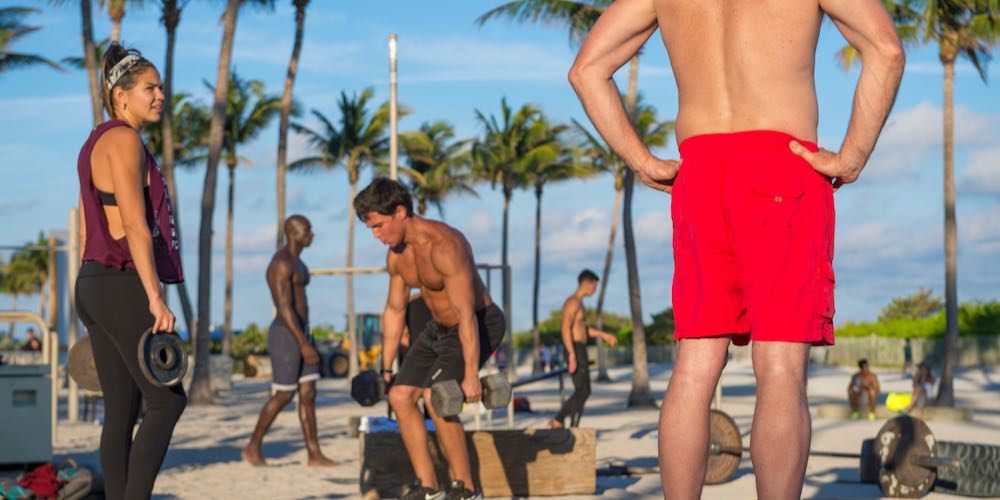The polity, Aristotle tells us, is where we do more than just stay alive: We are to live well, even nobly.
Exercising the Virtues
Mens sana in corpore sano—“sound in mind, sound in body”—is a piece of perennial wisdom. It comes to us from the Roman poet Juvenal but has roots in the culture and philosophy of ancient Greece. In America, it was once such common sense that a sneaker manufacturer turned it into a brand slogan.
Virtue ethics, one of the three main branches of ethics, is also inherited from the ancient Greeks. Virtue ethics is concerned with how or what kind of person one should be. It aims to cultivate human excellence through self-conscious mastery of habit.
At the foundation of these ideas is a recognition of the “formability” of the human being, both in body and mind. We are creatures whose present shape reflects our past history, a history over which we have increasing but always finite control as we age, as our capacities develop, and as our choices compound on each other.
Our bodies can be “deformed” and “reformed” only because they’re “formable” in the first place. Habitual postures and movements shape the body’s form. All the steroids in the world won’t give you the physique of a bodybuilder if you’re not going to the gym and performing certain lifts regularly. You can’t grow to 600 pounds without maintaining a consistent caloric surfeit. One’s body reflects one’s “lifestyle” or habitual living.
Portraitists, whether visual artists or writers, have always recognized this. The face is “the mirror of the soul” not just because it’s the most complexly expressive part of our anatomy, but also because it’s the one on which our expressive history is etched in the greatest detail. Its wrinkles and folds tell a story, a history—a history of habits. Habitually squinting at texts or screens, frowning much more often than smiling, furrowing one’s brows, and so on, all leave their mark. The most habitual formations of the face’s expressive muscles eventually solidify into features.
Both perennial wisdom and common sense recognize the formability of the human being, the connection between body and mind, and our agency over our own mental and corporeal self-formation.
Human character is expressed through the body, from facial expressions and gestures to speech. But it’s not just one’s outer body that is deformed and reformed through habitual expressions of one’s inner character. Human character itself is “formable.”
As we’ve known since Aristotle, perhaps the most influential virtue ethicist of all time, each decision one makes influences one’s future decisions. The first and second trips to the gym are the hardest, and it gets easier each time. Dieting, practicing piano, teetotaling, sticking to a budget, public speaking, keeping one’s house tidy, practicing radical honesty, resisting addictions, and mastering impulses of all kinds—they all get more effortless and may even become enjoyable as the habit is reinforced. You reshape yourself: your character adapts to habit and circumstance just like your body.
Both perennial wisdom and common sense recognize the formability of the human being, the connection between body and mind, and our agency over our own mental and corporeal self-formation. Hence the universal recognition of the importance of education throughout history. But nowadays there is so much “idle talk”—much of it valuing tradition-bucking novelty and transgression for their own sake—that it can drown out common sense and make us forget perennial wisdom.
Case in point: for years now, a slew of activists, including in the guise of “academics” and “journalists”, have waged an ideological war against physical fitness. There have been academic papers and news articles suggesting a connection between “fitness culture” or “gym culture” and political incorrectness in one or another form—whether “toxic masculinity,” “racism,” or some other “phobia” or “ism.” Most recently, a spate of articles of questionable newsworthiness discussing an academic paper of dubious merit have suggested a connection between fitness and “fascism.”
This literature doesn’t always attack fitness culture and its virtues directly. For example, some critics focus on exposing the “privilege” that is a precondition for various kinds of fitness activity—e.g., to work out in a gym, one must be able to afford a membership. This implies that fitness is a good thing and the problem with it is one of access. But some of the political activism around fitness does directly target it, especially when “fat” as a political identity drives the activism. A lot of work has gone into mainstreaming this “identity” in recent years. The “body positivity movement” has taken up the mantle of academic “fat activists”, who were theorizing about “fat justice” in journals like Fat Studies as far back as 2012.
Why is taking personal responsibility for the ongoing formation of our own bodies and minds so important? Because humans are the adaptable creature par excellence.
This is bad for many reasons. But for a moment, forget about the national obesity epidemic. Set aside the fact that 78% of the people hospitalized with covid were overweight or obese. Set the mountains of evidence linking being overweight or obese to a plethora of diseases and health conditions. Instead, thinking of virtue ethics, simply consider the fact that physical fitness is a matter of the habitual exercise of will.
Perhaps it is possible to be disciplined and self-mastered in mind but not body, or in body but not mind. Yet the two are connected because we are whole persons, bodies and minds conjoined—with one will. Whenever one exercises one’s will, it contributes to one’s personal history of willing, which affects how one is disposed to will in the future. Habitual self-discipline in the corporeal makes habitual self-discipline in the mental easier, and vice versa, because we have but one will through which to exercise our agency—whether that be in mental thought or bodily action, in private fantasy or public reality.
Why is taking personal responsibility for the ongoing formation of our own bodies and minds so important? Because humans are the adaptable creature par excellence. Humans will adapt. They will reform (or deform) their bodies and minds in conformity with their habitual circumstances, and their habitual ways of navigating these circumstances. This will happen, whether by conscious will or by unconscious instinct—and whether in accordance with one’s own will or that of another. Virtue ethics simply urges us to exercise what agency we have over this process, so we can direct it to our own good.
What happens when we passively let our natural adaptability be governed by external forces and the wills of others? Consider a concrete example. Suppose you find yourself wearing a cloth face mask when this practice is no longer mandated by law or institutional policy. Suppose you can’t give a good explanation as to why you’re doing this, unless it’s that it makes you feel good in some way (safer, more altruistic, etc.)—in which case you can’t give a good explanation as to why it makes you feel that way (since it doesn’t in fact meaningfully increase your own or others’ safety).
The truth is that you enjoy the warm comfort of conformism. Regardless of whether it’s also conformism to a fad, ideology, social pressure, or anything “external,” it’s a conformism with regard to your own established habit. It’s the feeling of a kind of existential “fitting in”. Not necessarily fitting in with others, but fitting into your own “rut”—whether that be private and yours alone or comfortingly crowded.
From a virtue ethical perspective, the key is to take control of this natural tendency, to use it. Make your rut one you actively choose for your own good as the human you are and the person you want to be, rather than a rut you wake up one day to find yourself having fallen into. And remember that “your good” isn’t just whatever you make of it, for you are a particular kind of being with natural abilities and needs—and for humans, the gym rat’s routine is objectively a much better rut to settle into than the couch potato’s.
Of course, as Aristotle also noted, humans are social creatures. No man is an island, and we make choices in a social context. We find it easier to form and maintain a habit when it is socially normalized, and much harder when socially stigmatized. A century ago, wearing pajamas in public would have caused a scandal; today, it’s practically a dress code for many shoppers at Wal-Mart. A soda used to be a special treat for Sunday trips to the drugstore; now many schoolchildren imbibe sodas all day long.
That’s why “fitness” is necessarily not just a personal but also a cultural concern. It’s easy to form healthy habits when you’re surrounded by a culture that valorizes fitness and enables and encourages healthy eating. It’s a lot harder when cultural influencers not only insist that all lifestyles are equally valid, but moreover reverse traditional praise-blame calculi related to fitness. For an increasingly prominent strain of our culture not only disapproves of blaming the physically unfit for their lack of fitness, but insists on praising them for non-physical virtues (e.g., “courage”), or even celebrating unfit bodies for contributing to “size diversity” as a type of “body diversity.” Meanwhile, the same people refuse to praise the physically fit for their fitness and instead regularly blame them for non-physical vices (e.g., “ableism”).
Common-sense, perennial wisdom tells us that the human being has agency over the formation of his or her “mind-body” and therefore responsibility for exercising this agency. This is part of our own cultural inheritance as Americans and as Westerners. There are of course analogs in non-Western traditions—underscoring just how “common” and “perennial” this wisdom really is.
It is a cultural inheritance worth preserving—and defending.



